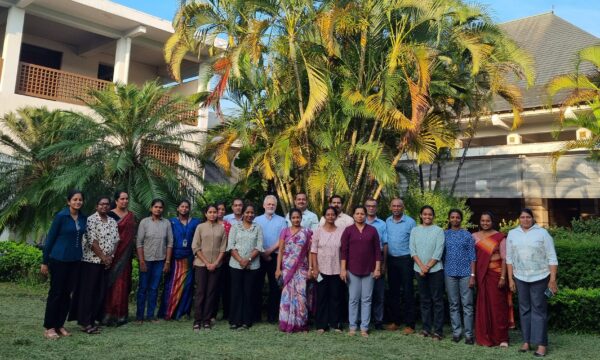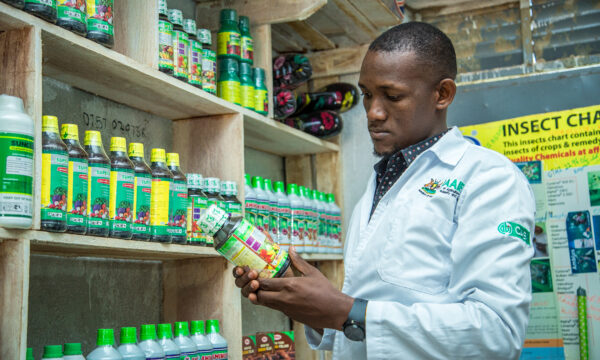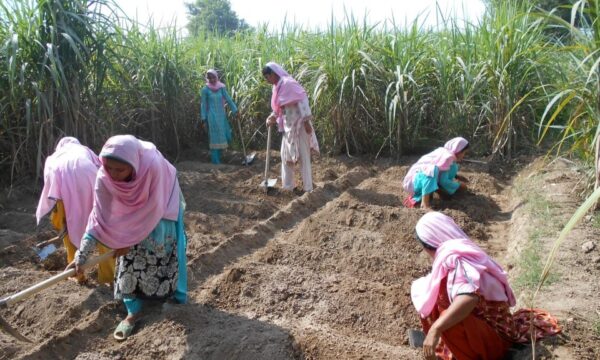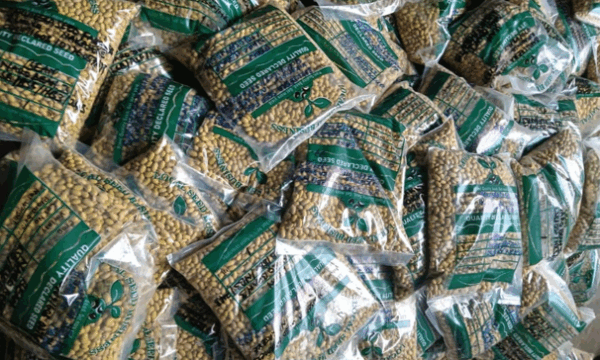
CABI has worked in partnership to produce a training module on lower-risk plant protection products to help agro-input dealers in Uganda reduce the risks associated with highly hazardous pesticides to deal with a range of crop pests.
The training module incorporates a training curriculum, training materials – with a more participatory approach – and a training manual entitled ‘Course companion for training on lower-risk plant protection products: Reducing the risk of highly hazardous pesticides.’
The resource is funded by the CABI-led PlantwisePlus programme and follows two years of collaboration with the Ugandan government and will now be used to train agro-input dealers with the current Makerere University/Ministry of Agriculture, Animal Industry and Fisheries (MAAIF) manual on safe handling of agrochemicals.
Materials as part of an overall training toolkit
CABI scientists from Uganda and its Swiss Centre in Delémont also worked closely with colleagues from MAAIF, Makerere University, the Uganda National Agro-input Dealers Association (UNADA) and The National Agricultural Research Organization (NARO) of Uganda to produce the materials as part of an overall training toolkit.
Dr Jayne Crozier, Team Leader/Plant Pathologist, and Dr Keith Holmes, Integrated Crop Management Advisor, edited the training manual which was officially handed over to officials from MAAIF and Makerere University include in their curriculum.
Improving knowledge of lower risk bioprotection products
The training manual is being used to improve knowledge of these products among MAAIF, University and district local government staff and agro-input dealers. This is then intended to improve access and distribution to farmers with good advice
The course and accompanying training manual have been developed primarily for agro-input dealers to enable them to recognise highly hazardous pesticides and allow them to advise farmers on lower risk alternatives for crop protection.
The manual also aims to, specifically, raise awareness about bioprotection products, what they are, how they work and how they are used.
In addition to agro-input dealers the course and manual will be useful to anyone who provides advice to farmers, such as extension staff and even farmers themselves who wish to find out more about selecting and using lower risk plant protection products (synthetic chemical or biologicals) for pest management.
Safe and sustainable pest control

Christine Alokit, Communication and Extension Scientist at CABI, said, “Pesticides can help increase agricultural productivity but, if used wrongly, can pose serious risks to human health and the environment.
“In Uganda, like other low-and middle-income countries, agro-input dealers play a key role in supplying farmers with inputs including fungicides, herbicides and insecticides to help tackle a range of crop pests such as the fall armyworm.
“We foresee that this training module will support agro-dealers and others in better understanding chemical pesticides and non-chemical products that can be used to promote safe and sustainable pest control which smallholder farmers rely upon.”
She added that the risks posed by chemical pesticides include biodiversity loss, soil and water pollution and the poisoning of beneficial insects such as pollinators. For humans, the risks include potential food contamination and acute and chronic health issues.
PlantwisePlus is working to change this, helping the people who train agro-dealers to upskill and learn more about non-chemical pest control.
Lower-risk plant protection products using an IPM approach
For example, in October 2023 the programme delivered, with Uganda’s Ministry of Agriculture and Makerere University, a ‘training of trainers’ workshop to people who train agro-dealers. The workshop focused on incorporating lower-risk plant protection products using an Integrated Pest Management (IPM) approach.
Ms Alokit added, “The reach of extension services is often limited. In Uganda, only an estimated 22% of farmers are covered by the public extension system. So, many smallholder farmers rely on agro-dealers for advice and support.
“The training module, including the manual, will go a long way towards developing more job opportunities for young people in Uganda and empowering them and others with the information and skills they need to become ‘champions’ of sustainable pest management.”
So far, 120 people have benefited from the training module including Training of Trainers (ToTs), district extension officers and agro-input dealers.
Additional information
Main image: The training manual will help raise awareness of lower risk bioprotection products as well as how to use chemical pesticides safely as part of an Integrated Pest Management approach to sustainable pest management (Credit: CABI).
For more details contact: Christine Alokit c.alokit@cabi.org
Relevant stories
‘Blueprint for change: how a training manual will support pesticide risk reduction in Uganda.’
‘Can Uganda’s agro-dealers become champions of sustainable pest control?’
CABI BioProtection Portal
Learn more about biopesticide products on the CABI BioProtection Portal.
PlantwisePlus
PlantwisePlus gratefully acknowledges the financial support of the Directorate-General for International Cooperation (DGIS), Netherlands; European Commission Directorate General for International Partnerships (INTPA, EU); the Foreign, Commonwealth & Development Office (FCDO), United Kingdom; and the Swiss Agency for Development and Cooperation (SDC).
1 Comment
Leave a Reply
Related News & Blogs
Post-registration pesticide reviews: Experiences, learnings and best practices
CABI’s PlantwisePlus programme recently hosted a webinar to raise awareness and potential solutions to the challenges around post-registration pesticide reviews – a vital stage in the review process that helps ensure compliance with safety regulations…
9 July 2025





This is very important,I highly recommend the effort,
Many populations are at high risk of pesticide residue poisoning if not enlightened and re-enforced.